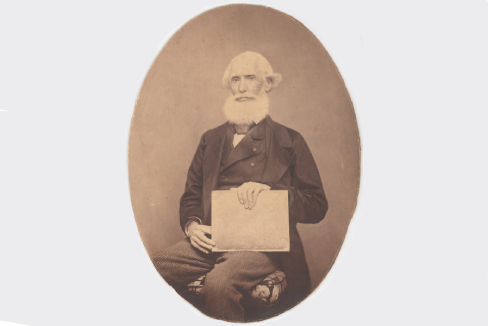About the George Finlay Papers

The George Finlay Papers contain materials created by and related to the British Historian and Philhellene George Finlay, his father John Finlay, Greek-American Philhellene George Jarvis, and British Philhellene Captain Frank Abney Hastings, dating from 1791 to 1949. Most of the collection consists of George Finlay’s meticulous records of his travels, personal and official correspondence, his personal expenditures, copious memoranda on strategy and on military and political organisation, journal entries, maps, facetiae, scrapbooks, personal notes on people—Greeks and others—and on revolutionary events, newspaper cuttings mainly on Greece and international affairs, as well as Finlay’s original manuscripts of the History of the Greek Revolution (1861) as well as corrected proofs of Finlay’s other published works.
Also included are the papers of Finlay’s father, John, two journals of Greek American philhellene, George Jarvis, and those of Finlay’s fellow British philhellene, Captain Frank Abney Hastings. The Hastings papers, which Finlay purchased in 1830, include personal and official correspondence, ship’s logs, notes that he took on board or ashore, as well as memoranda on strategy and on the naval organisation of the revolutionary forces. Collectively, these records reveal a great deal about the character, motivations, ideas, as well as the military and political judgements of these British individuals, as well as of many others, both British and Greek, with whom they interacted during the Greek War of Independence as well as many of Finlay's other interests, such as Classical and Byzantine history, natural history and politics.
Press cutting on 'the wit and humour of the South-Sea Islanders' (previously loose in J. L., Prehistoric Times . . ., London, 1865).
Visiting card of Professor Donaldson (stuck on front pastedown of T. L. D., Architectura numismatica . . ., London, 1859).
Professor T. L. Donaldson to George Finlay. 21 Upper Bedford Place, Russell Square, London, March 1872. : To introduce the geologist Professor Ansted, who is visiting Athens (stuck on front flyleaf of T. L. D., Architectura numismatica . . ., London, 1859).
Robert G. Watson to George Finlay. Athens, 12 February 1872. Has made the acquaintance of many who took part in the Greek Revolution and asks for loan of George Finlay's History of the Greek Revolution (loose at front of Charles Thomas Newton, Travels and Discoveries in the Levant, vol. 1, London, 1865).
Robert G. Watson to George Finlay. On the Atlantic, 17 April 1872. Asks George Finlay to review his Handbook on Greece; is en route for Japan (loose at front of Charles Thomas Newton, Travels and Discoveries in the Levant, vol. 1, London, 1865).
News clipping on Antiquities in Cyprus, The Times, 14 Dec 1872 (loose in Charles Thomas Newton, Travels and Discoveries in the Levant, vol. 1, London, 1865).
John Evans to George Finlay. Nash Mills, Hemel Hempstead, 20 April 1872. Thanks for receipt of obsidian flints found in Corinth and Salagova; comparison with Mexico and Egypt (previously stuck on front flyleaf of J. Evans, The Ancient Stone Implements . . ., London, 1872).
Stephanos A. Koumanoudes to George Finlay. Athens, 8 June 1872. Asks for George Finlay's comments on K's sepulchral inscriptions (in French, stuck on front flyleaf Ἀττικῆς Ἐπιγραφαὶ Επιτύμβιοι, Athens, 1871).
Samuel P. Oliver to George Finlay. Hotel d'Angleterre, 1 November 1872. On possibility of purchasing collection of bronze and stone implements from Mesolonghi. George Finlay's advice sought (stuck on front flyleaf of S. P. Oliver, Madagascar . . ., London, n.d.).
Samuel P. Oliver to George Finlay. Hotel d'Angleterre, 5 November 1872. On possibility of purchasing collection of bronze and stone implements from Mesolonghi. George Finlay's advice sought (stuck on front flyleaf of S. P. Oliver, Madagascar . . ., London, n.d.).
H. Carter to George Finlay. 28 September 1872. To introduce archaeologist Captain Oliver (stuck on front flyleaf of S. P. Oliver, Madagascar . . .).
Robert Keep to George Finlay. Berlin, October 1872. To introduce George Bancroft, U.S. ambassador in Berlin, visiting Athens (stuck in front of G. Bancroft, History of the United States . . ., vol. 1, Boston, 1854).
George Bancroft to George Finlay. Athens, 23 November 1872. Returns a book lent by George Finlay (previously stuck on front flyleaf of G. B., History of the United States . . ., vol. 1, Boston, 1854). Envelope to George Finlay stuck on inside cover and George Bancroft's visiting card loose.
Visiting card of George Bancroft (previously loose in G. B., History of the United States . . ., vol. 1, Boston, 1854). Envelope to George Finlay stuck on inside cover and George Bancroft's visiting card loose.
Achille Postolacca to George Finlay. Athens, 12/24 December 1872. Thanks for George Finlay's review of his work (in French, stuck on front flyleaf of A. P. Κατáλογος τῶν ἀρχαíων Νομισμάτων vol. 1, Athens, 1872, with note by George Finlay of various journals in which the review appeared).
W. Stuart to George Finlay. Athens, 20 March 1873. Thanks for gift of George Finlay's book on Conquest of the Morea in 1715 (previously attached to front flyleaf of F. R. Chesney, Expedition for the Survey of the Rivers Euphrates and Tigris . . ., vol. 1, London, 1850).
Note on the Treaty of Tilsit between Napoleon and Tsar Alexander of Russia (previously loose in F. R. Chesney, Expedition for the Survey of the Rivers Euphrates and Tigris . . ., vol. 1, London, 1850).
Visiting card of Rev. A. N. Arnold (previously loose in F. R. Chesney, Expedition for the Survey of the Rivers Euphrates and Tigris . . ., vol. 1, London, 1850).
George W. Cox to George Finlay. The Knoll, Farnborough, Hants, 4 December 1873. Friend of E. A. Freeman; sends George Finlay his Tales of Ancient Greece, London, 1872, and asks if any prospect of translating it into Greek. Would like to settle in Greece (stuck on front flyleaf of C's book) [cf. above, p. 89, B/6/179
Press cutting of advertisement for A History of Greece by George W. Cox, London (previously loose in Tales of Ancient Greece by George W. Cox, London, 1872)
Sir George Ferguson Bowen to George Finlay. n.d. Thanks George Finlay for his book; offers to be his cicerone in Corfu ; sends copy of his recently published pamphlet (stuck on front flyleaf of G. F. Bowen, Mount Athos, Thessaly, and Epirus . . ., London, 1852.
Press cutting on the new Dean of St Paul's, the Rev. R. W. Church (previously loose in G. F. Bowen, Mount Athos, Thessaly, and Epirus . . ., London, 1852.).
Christos Nikolaides Philadelpheus to George Finlay. n.d. [1843?]. Asks to borrow George Finlay's copy of Ἐλληνομνημων, 1843 (in French, attached to front flyleaf of this book).
Wilfred S. Blunt to George Finlay. n.d. Apologizes for mislaying book lent him by George Finlay (stuck on front flyleafof J. H. C. Schubert, Pausaniae Descriptio Graeciae, vol. i, 1853, with note by Blunt 'In payment of a bad debt').
Jean-Alexandre Buchon to George Finlay. 16 June, n.y. re purchase of memoirs of James Horner (in French; previously stuck on front flyleaf of J. A. C. B., Nouvelles recherches historiques sur . . . la principauté française de Morée, vol. II, Paris, 1843).
? to George Finlay. n.d. The Book Club and dispatch of reviews (previously at back of P. Le Bas, Précis d'histoire du Moyen Age . . ., Paris, 1839).
James Clyde to George Finlay. n.d. Thanks for receipt of newspapers (previously stuck on back flyleaf of J. A. Cramer, A Geographical and Historical Description of Ancient Greece, vol. 1, Oxford, 1828).
n.d. Note by George Finlay on Carlos Troya, Della condizione de' Romani vinti da' Longobardi . . ., Naples, 1841 (loose in T's book).
n.d. Notes by George Finlay on Napoleon III, Histoire de Jules César, Paris, 1865 (previously loose in book).
Miss Constance MacGregor to Mr. William Cooke. 27 May n.y. Personal details and references to 'The Exhibition' (stuck on front flyleaf of Official Catalogue of the Great Exhibition . . ., London, 1851).
News clipping on Paris Universal exhibition, The Times, 26 Mar 1856 (previously loose in Official Catalogue of the Great Exhibition . . ., London, 1851).


